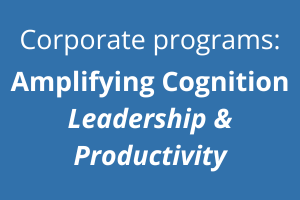- Humans + AI with Ross Dawson
- Posts
- AI and the quality of human ideas, Marek Kowalkiewicz on the economy of algorithms, AI therapists, and more
AI and the quality of human ideas, Marek Kowalkiewicz on the economy of algorithms, AI therapists, and more
"The brain is our guiding inspiration for how to build AI, and AI is our litmus test for how well we understand the brain.” - Max Bennett
This newsletter and much of my work is centered on how AI can enable better human thinking and decision-making. There are many ideas tied into this and I’m wondering how best to communicate that. “AI-Augmented Thinking”? “AI-Enhanced Thinking”? “Intelligence Augmentation”? “Humans + AI Thinking”? Please let me know what you think in this LinkedIn poll!
Some big developments coming in our Humans + AI initiatives, stay tuned. For now, the next cohort of my AI-Enhanced Thinking & Decision-Making course starts March 28. Get a 20% discount with code: ACNEWSLETTER.
Ross
📖In this issue
How AI ideas affect the quality of human ideas
Scientific progress requires humans but AI can help: Stephen Wolfram
The rise of AI therapists addresses demand but raises concerns
Anthropic releases Claude 3, which exceeds GPT-4 across a range of benchmarks
LLMs generate better prompts than humans, suggesting prompt engineering jobs are dead
Marek Kowalkiewicz on the economy of algorithms, armies of chatbots, LLMs for scenarios, and becoming minion masters
Expert and public insights into the impact of AI by 2040
🤸🏽In practice
How AI ideas affect the quality of human ideas
Among the increasing body of research on Humans + AI thinking and creativity, an study of over 800 people in 40 countries uncovered useful insights into how using AI ideas can lead to greater diversity, the role of self-assessed creativity in how ideas are used, and collective idea generation quality.
👩🤖Humans + AI update
Scientific progress requires humans but AI can help: Stephen Wolfram
“There are still all sorts of scientific questions that remain. So can AI now come in and just solve all of them? To this ultimate question we’re going to see that the answer is inevitably and firmly no. But that certainly doesn’t mean AI can’t importantly help the progress of science.”
AI tutoring improves maths performance in Africa
An AI WhatsApp chatbot was used by 1000 Ghanaian school students twice a week on low-bandwidth networks, resulting in a “subtantial” improvement in their maths skills and growth.
RoboChem automates chemical experiments
A robotic software and hardware platfrom, RoboChem, uses AI to design and perform synthetic organic chemistry experiments, applying Bayesian optimization algorithms to improve the transformations.
The rise of AI therapists addresses demand but raises concerns
The Guardian digs into this thorny issue: “It’s cheap, quick and available 24/7, but is a chatbot therapist really the right tool to tackle complex emotional needs?”
‘He checks in on me more than my friends and family’: can AI therapists do better than the real thing?
🔥Hot news in AI
Anthropic releases Claude 3, which exceeds GPT-4 across a range of benchmarks - CNBC
In a fun to-and-fro of Elon Musk suing OpenAI and revelations of early OpenAI emails, Musk says he will drop the lawsuit if it changes its name to ClosedAI - Business Today
A (limited scope) study shows that LLMs generate better prompts than humans, suggesting prompt engineering jobs are dead - IEEE Spectrum
TripoSR from Stability AI generates 3D models from single images - StabilityAI

🎙️Latest podcast episode
What you will learn
Exploring the economy of algorithms
The role of software and people in shaping digital futures
Navigating the balance between automation and human oversight
The metaphor of digital minions in the algorithmic world
Engaging with generative AI and chatbots for practical tasks
Implementing AI responsibly in academic and commercial research
The importance of human agency in the age of automated decision-making
💡Resources and insights
Expert and public insights into the impact of AI by 2040
A deep report on the impact of AI on individuals and society by 2040 draws on interviews with hundreds of experts as well as a broad public opinion survey. “ The experts were far more concerned than the public about a growing wealth inequality in society but somewhat less concerned than the public about the impact on employment opportunities.”






